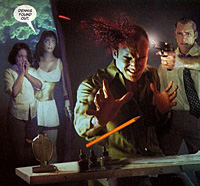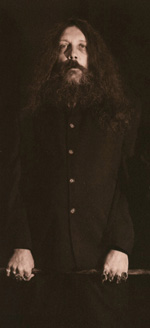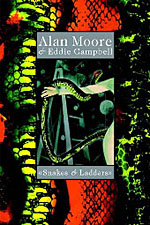>> Thumbnail: Alan Moore
>> Snake Charmer: An interview with Alan Moore, Part Two
More...

To read part one of this interview, click here.
It's hard not to be intimidated by Alan Moore. In addition to being an acclaimed and hugely influential writer, Moore is also a big scary man with an enormous beard and an absolutely biblical voice. He's also been the subject of more urban legends than any author since JD Salinger. I'm sure we've all heard them:
Alan Moore hasn't left his bedroom in over a decade.
Alan Moore has tea with the ghost of Aleister Crowley every second Tuesday.
Alan Moore is wanted by the CIA. No one knows why.
Alan Moore sacrifices things in his basement. Usually journalists.
Having acquired a reputation as the Mad Genius of Comic Books, you have to wonder what Alan Moore himself thinks of the Alan Moore stories. "I'd probably like it if they were more elaborate. People are not fantasising hard enough. They can come up with better stuff than that. I probably don't even hear most of these rumours because I tend to just stay here in my kind of - well, I wouldn't say it was normal - my slightly unusual terraced house in Northampton. I don't venture far outside. I mean, even the other end of the living room is a bit of a mystery to me, so I tend not to hear much of that."
'Most of my ideas these days tend to be heavily coloured by magic.' What about the Howard Hughes-style recluse stories: 'Alan Moore hasn't left his house in twenty years,' etc.? Alan laughs. "Well, Alan Moore goes out nearly every day, if only to walk downtown. For example, today I went and took my laundry to the launderette where the really nice ladies always return it to me nicely pressed and folded.
"I don't really leave the country anymore, that's true. I can't be bothered; don't really have the time. I leave Northampton very seldom. I'll go to London if there's pressing business that needs attending, or go up north to see my daughters, but Northampton's got pretty much everything I could possibly need, obscurity and silence being two of the most attractive features.
And what about the more sinister rumours? "Yeah, I have heard the rumours about how I'm not allowed to visit America because the CIA are still cross with me about BROUGHT TO LIGHT. That's not true. The reason I can't visit America is that I haven't got my passport renewed, and getting one doesn't really sound like something I can see myself doing at the moment.
"Apathy is the key to an awful lot of my behaviour. It's the reason I've got this ridiculous beard and haircut. It's just simple laziness. I can't be bothered to shave every morning like ordinary people do. I can't be bothered going to the barbers or places like that. I could be sitting here writing my silly-arse comic books or composing some new incomprehensible magical tract, which is much preferable to me."
 Alan's first full-length novel, VOICE OF THE FIRE, is finally getting a mass-market release. What does he think of the new edition? "It's going to get an American release via Top Shelf, and this will be this new lavish edition with the José Villarubia illustrations. José has done an awful lot of stuff in comics, and he's a master of digital artwork. He did a wonderful digital section in one of the early PROMETHEAs [issue #7, "Rocks and Hard Places"] where he'd actually found models that looked like the various characters. I though it was one of the best comics sequences I've seen, it had some marvellous things in it.
Alan's first full-length novel, VOICE OF THE FIRE, is finally getting a mass-market release. What does he think of the new edition? "It's going to get an American release via Top Shelf, and this will be this new lavish edition with the José Villarubia illustrations. José has done an awful lot of stuff in comics, and he's a master of digital artwork. He did a wonderful digital section in one of the early PROMETHEAs [issue #7, "Rocks and Hard Places"] where he'd actually found models that looked like the various characters. I though it was one of the best comics sequences I've seen, it had some marvellous things in it.
"José is a wonderful photographer. He's doing an adaptation of THE MIRROR OF LOVE, which is a poem that I wrote for an anti-government homophobia magazine back in the late 80s as a protest for the some anti-gay legislation that the conservatives were trying to bring in. I'd written this fairly comprehensive, if condensed, history of gay culture, and I'd squeezed it into about eight pages. What José's going to do is expand that into an 80-page book, with one verse on one page, and one of his images on the other page.
"At the same time he suggested this, he suggested doing an American edition of VOICE OF THE FIRE, with him doing a series of twelve of his digitally-manipulated photo images, with one image to represent each of the different narrators in the book. So he'll be doing an image of the eleventh century crusader, the 1930s burning car murderer, the Jacobean head on a spike.
"One of the big advantages - and probably why I really agreed to it - is that I'm the writer of the last chapter, so he had to take a glamorous-looking picture of me. I think my extraordinary physical beauty really does deserve a full-page picture, instead of one of those little panels on the back cover. I'm looking forward to that. I still don't know if anyone will be able to make heads or tails of the novel itself, but when they find the text incomprehensible, they can always sit and stare at the pictures for an hour or two."
"José is a great performer [as well]. He did a performance of THE MIRROR OF LOVE at some kind of queer fest or something in Boston - sort of a queer film festival. José did a performance which he sent us a video of, which he performed entirely naked. And I've got to say, you know, nice arse."
 How has Moore's performance work gone over with the occult community? "The only time that we've done one specifically for the occult community at large was the SNAKES AND LADDERS performance, and the audience as a whole seemed to love it. The magicians that I met there - at least the ones that I have respect for - seemed to be quite bowled over, because nobody in magic does this. Nobody in performance does stuff involving magic in the way we do, and nobody in magic does stuff involving performance in quite the way we do. It's a fairly new idea for them.
How has Moore's performance work gone over with the occult community? "The only time that we've done one specifically for the occult community at large was the SNAKES AND LADDERS performance, and the audience as a whole seemed to love it. The magicians that I met there - at least the ones that I have respect for - seemed to be quite bowled over, because nobody in magic does this. Nobody in performance does stuff involving magic in the way we do, and nobody in magic does stuff involving performance in quite the way we do. It's a fairly new idea for them.
"The occult community is as easily impressed as anyone is in these matters, you know. The days of Crowley doing his performances are long gone. People haven't seen anything like this since the 20s or 30s; so, consequently, the reception in the occult community has been very, very encouraging. I think to a lot of them it might be like a breath of fresh air."
Artist and long-time friend Eddie Campbell has done a few comic book adaptations of Alan Moore's performances, and some have criticized them for being too literal. Moore disagrees. "I love it. I think it was with THE BIRTH CAUL that Eddie first asked if he could turn something into a comic book adaptation, and I genuinely hadn't considered turning one of these performances into a comic strip. But I've obviously got a very good relationship with Eddie and I tend to trust his instincts.
'Even the other end of the living room is a bit of a mystery to me.' "I was very pleased with the way he had interpreted THE BIRTH CAUL, so when he asked if he could interpret SNAKES AND LADDERS as well, I said 'Yeah, I've got no problem with that,' mainly because I didn't actually have to do anything - I didn't have to write out a script, or anything like that, I can just leave it all to Eddie.
"[The SNAKES AND LADDERS adaptation] is very much his work, his interpretation of the piece, and there were some very poetic images in there. Particularly the way that he cleverly used all of Rosetti's angels from that golden staircase picture - he'd managed to fit that exactly onto the DNA spiral, so you've got a whole bunch of Rosetti's angels walking down a double-helix. Very poetic, very lovely."
Moore has great admiration for Campbell's adaptation skills. "I think that these are probably difficult works to adapt, when it's just sort of a string of sometimes semi-disconnected ideas. Sometimes you might have to make choices; to handle one section in a more impressionistic way, another section in a more strictly literal fashion - these are the choices that Eddie has to make. But by and large, I've been very happy with the choices that Eddie's made."
 A lot of the themes and symbols used in Moore's magical performances - especially SNAKES AND LADDERS - are echoed in his comic PROMETHEA, including the idea of Imagination personified as a woman. How closely would he say the two works are related? "Well, they're both outgrowths of my thinking during this stretch of my life. The performances seem to be a natural way of expressing magical ideas, and since I know my way around writing a comic, it seemed natural to try to express magical ideas through PROMETHEA as well.
A lot of the themes and symbols used in Moore's magical performances - especially SNAKES AND LADDERS - are echoed in his comic PROMETHEA, including the idea of Imagination personified as a woman. How closely would he say the two works are related? "Well, they're both outgrowths of my thinking during this stretch of my life. The performances seem to be a natural way of expressing magical ideas, and since I know my way around writing a comic, it seemed natural to try to express magical ideas through PROMETHEA as well.
"I suppose the reason for doing both is that there are things you can do in the comics medium that you simply can't do in performance, and vice-versa. In some of the issues of PROMETHEA we've done quite complex interplays of words and images, or complex structures, things that are a novelty for the comic book that you couldn't do in any medium other than in a comic book.
"Most of my ideas these days tend to be heavily coloured by a magical world view. You get similar ideas finding their way out and expressing themselves in different terms - in comics or in performance or in the CDs, or whatever I happen to be doing.
Moore plays around a bit with the comics world on SNAKES AND LADDERS, making sly references to "back continuities" and talking about the time he claims to have actually met John Constantine. Does Alan Moore the magician ever feel the need to distance himself from Alan Moore the comic book writer? "Funny you should ask that," he says with a laugh.
"I'm certainly not ashamed of the work I've done in comics. SNAKES AND LADDERS [contains] the only specific reference I've made to the fact that I'm a comic writer, because it was relevant in terms of what we were talking about. Not that I'm ashamed of the comics, or that in the comics I'm ashamed of the magic stuff. I'm pretty open about all of it."
So what does the magician have up his sleeve at the moment? "What I'm trying to do at the moment is finish off all of the mainstream comics work around the end of this year, at which point having retired effectively from mainstream comics, I want to play around with things I've been neglecting. Like, I used to quite enjoy drawing at one point, and although I could never draw quickly enough to actually have a career as an artist, it would be nice to have the freedom to play around with a bit more artwork, some sculpture, more performance work.
"There will probably still be comics in the mix somewhere, almost certainly. It's a medium that I have a great deal of fondness for, and that I feel there's still a lot of potential in.
"But, yes, I will be putting distance between my mainstream comics career and my magical work, simply by closing down my mainstream comics career and becoming a full-time magician."

This article is Ideological Freeware. The author grants permission for its reproduction and redistribution by private individuals on condition that the author and source of the article are clearly shown, no charge is made, and the whole article is reproduced intact, including this notice.


